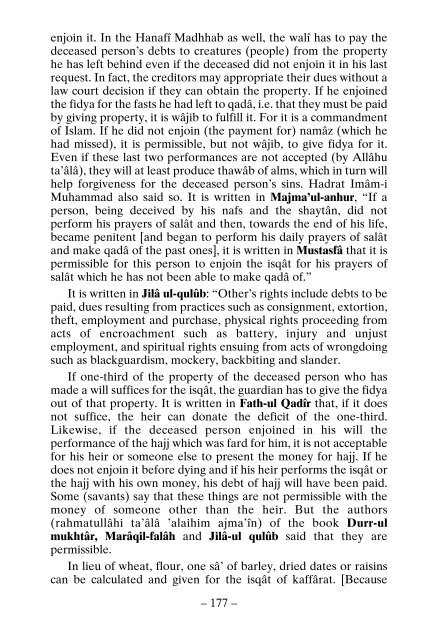Book of Namaz
You also want an ePaper? Increase the reach of your titles
YUMPU automatically turns print PDFs into web optimized ePapers that Google loves.
enjoin it. In the Hanafî Madhhab as well, the walî has to pay the<br />
deceased person’s debts to creatures (people) from the property<br />
he has left behind even if the deceased did not enjoin it in his last<br />
request. In fact, the creditors may appropriate their dues without a<br />
law court decision if they can obtain the property. If he enjoined<br />
the fidya for the fasts he had left to qadâ, i.e. that they must be paid<br />
by giving property, it is wâjib to fulfill it. For it is a commandment<br />
<strong>of</strong> Islam. If he did not enjoin (the payment for) namâz (which he<br />
had missed), it is permissible, but not wâjib, to give fidya for it.<br />
Even if these last two performances are not accepted (by Allâhu<br />
ta’âlâ), they will at least produce thawâb <strong>of</strong> alms, which in turn will<br />
help forgiveness for the deceased person’s sins. Hadrat Imâm-i<br />
Muhammad also said so. It is written in Majma’ul-anhur, “If a<br />
person, being deceived by his nafs and the shaytân, did not<br />
perform his prayers <strong>of</strong> salât and then, towards the end <strong>of</strong> his life,<br />
became penitent [and began to perform his daily prayers <strong>of</strong> salât<br />
and make qadâ <strong>of</strong> the past ones], it is written in Mustasfâ that it is<br />
permissible for this person to enjoin the isqât for his prayers <strong>of</strong><br />
salât which he has not been able to make qadâ <strong>of</strong>.”<br />
It is written in Jilâ ul-qulûb: “Other’s rights include debts to be<br />
paid, dues resulting from practices such as consignment, extortion,<br />
theft, employment and purchase, physical rights proceeding from<br />
acts <strong>of</strong> encroachment such as battery, injury and unjust<br />
employment, and spiritual rights ensuing from acts <strong>of</strong> wrongdoing<br />
such as blackguardism, mockery, backbiting and slander.<br />
If one-third <strong>of</strong> the property <strong>of</strong> the deceased person who has<br />
made a will suffices for the isqât, the guardian has to give the fidya<br />
out <strong>of</strong> that property. It is written in Fath-ul Qadîr that, if it does<br />
not suffice, the heir can donate the deficit <strong>of</strong> the one-third.<br />
Likewise, if the deceased person enjoined in his will the<br />
performance <strong>of</strong> the hajj which was fard for him, it is not acceptable<br />
for his heir or someone else to present the money for hajj. If he<br />
does not enjoin it before dying and if his heir performs the isqât or<br />
the hajj with his own money, his debt <strong>of</strong> hajj will have been paid.<br />
Some (savants) say that these things are not permissible with the<br />
money <strong>of</strong> someone other than the heir. But the authors<br />
(rahmatullâhi ta’âlâ ’alaihim ajma’în) <strong>of</strong> the book Durr-ul<br />
mukhtâr, Marâqil-falâh and Jilâ-ul qulûb said that they are<br />
permissible.<br />
In lieu <strong>of</strong> wheat, flour, one sâ’ <strong>of</strong> barley, dried dates or raisins<br />
can be calculated and given for the isqât <strong>of</strong> kaffârat. [Because<br />
– 177 –

















